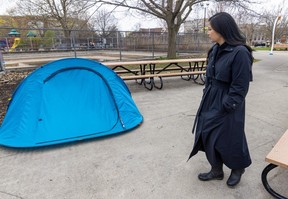Breadcrumb Trail Links
QuebecNewsLocal News
A warming centre in the borough recorded 5,785 visits this winter, hosting an average of 47 people per night .
Article content
Montreal’s opposition party is calling for a permanent emergency homeless shelter in the Côte-des-Neiges—Notre-Dame-de-Grâce borough after a warming centre saw unprecedented demand throughout the winter.
The borough’s lone warming centre recorded 5,785 visits between December and March 31, when it closed for the season, and helped an average of 47 people per night — more than twice as many as four years ago.
Advertisement 2
Article content
Article content
“Once that resource is closed, where do the people using it go and where can they access other kinds of resources? That’s something we do not have in the borough,” said Stéphanie Valenzuela, an Ensemble Montréal city councillor for the Darlington district.
Valenzuela and fellow Ensemble Montréal city councillor Sonny Moroz, who represents the Snowdon district, called a news conference Friday morning to draw attention to the issue.
The councillors will present a motion at next week’s borough council meeting to officially call on the borough administration to work toward opening a year-round, 24/7 shelter for the unhoused.
Joining them on Friday, Elisabeth Prass, the Quebec Liberal MNA for D’Arcy-McGee, said she will also push for the project with the provincial government.
“We can’t have a seasonal solution to a problem that is permanent,” said Prass, who is the Liberal party’s point person on homelessness.
The warming centre in question started as pilot project during the winter of 2020. Operated by local community organization Prévention CDN-NDG, it was initially located in a church basement before moving into the offices of the Multicaf food bank this winter.
Article content
Advertisement 3
Article content
The move was not without issues. Throughout the winter, neighbours and local businesses lodged complaints with the borough about violent behaviour, fights that spilled into the street and an increase in visible drug use.
Less than a month after the centre opened, a woman who used its services died from a presumed overdose. The Quebec coroner’s office is investigating the death.
In April, Multicaf’s director general told The Gazette that the organization is not interested in hosting the project again if it’s operated under the same parameters as last winter.
In a recent email to its partners, Prévention CDN-NDG addressed some of the concerns raised over the winter.
“The housing crisis, the opioid crisis and the chronic lack of mental health services are having devastating effects in Montreal, as elsewhere,” the organization wrote.
The organization acknowledged the growing demands in the borough have put “enormous pressure” on the resources that seek to help its unhoused population.
“While the deployment of these services can never be perfect in everyone’s eyes,” it continued, “our actions are always guided by the principle of providing essential support to the most vulnerable people in our society.”
Advertisement 4
Article content

At Friday’s news conference, it was explained that many of those who used the service now gather in the adjacent Martin-Luther-King Park, leading to cohabitation issues in the area. As the councillors spoke, a tent could be seen installed next to the park’s chalet.
Valenzuela said she understands residents’ concerns and said they have been understanding as the situation has worsened in recent years.
“The residents who are living around the area feel for these people and wake up every day, open their door and see that they have no place to go,” she said.
“(They) have been so compassionate and patient, and now it’s up to us elected officials to find solutions for everyone in the area.”
In an interview Friday, borough mayor Gracia Kasoki Katahwa pointed to how the borough provided funding for the warming centre this year to allow it to extend its hours throughout the winter.
As for the larger issue of homelessness, Kasoki Katahwa said she is aware of the need in the borough and is working closely with provincial and municipal partners to find short-, medium- and long-term solutions.
She evoked the possibility of a day centre or transitional housing to address the gap in services.
“The format will depend on the needs identified by the organizations who are already working with people experiencing homelessness,” Kasoki Katahwa said.
jfeith@postmedia.com
Recommended from Editorial

‘A monumental mess’: C.D.N.-N.D.G. re-evaluating warming centre for next year

Homelessness in the West Island? It’s ‘in every borough’

Closing of Hôtel-Dieu shelter highlights the challenge of relocating the unhoused
Advertisement 5
Article content
Article content
Share this article in your social network

















:max_bytes(150000):strip_icc()/Health-GettyImages-1339728990-1bf6270deb774df8b176c25081771051.jpg?w=120&resize=120,86&ssl=1)


